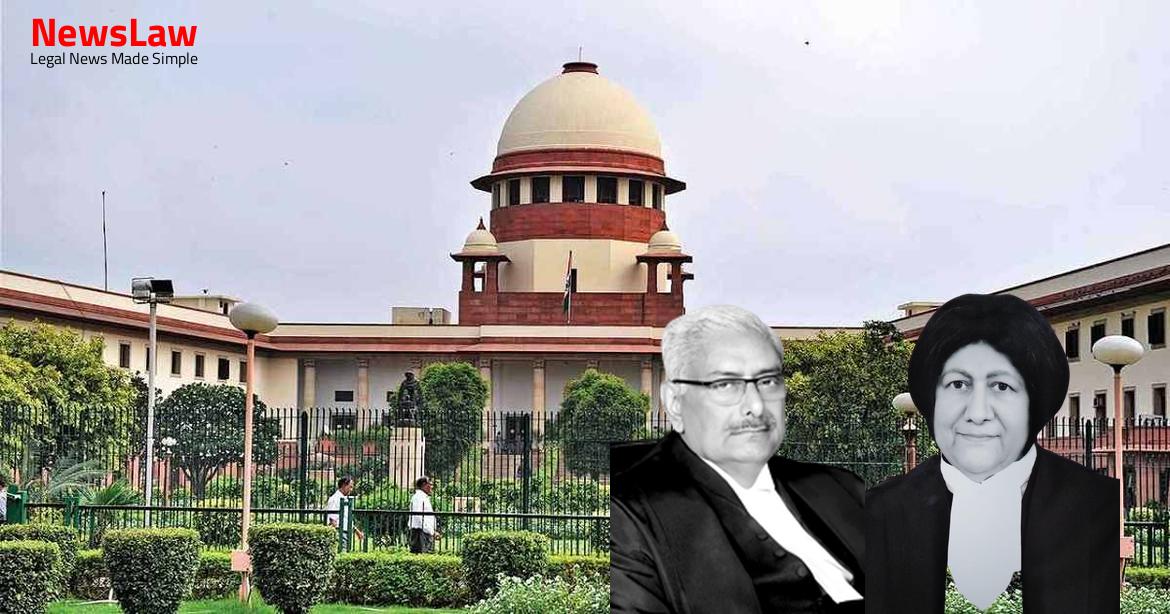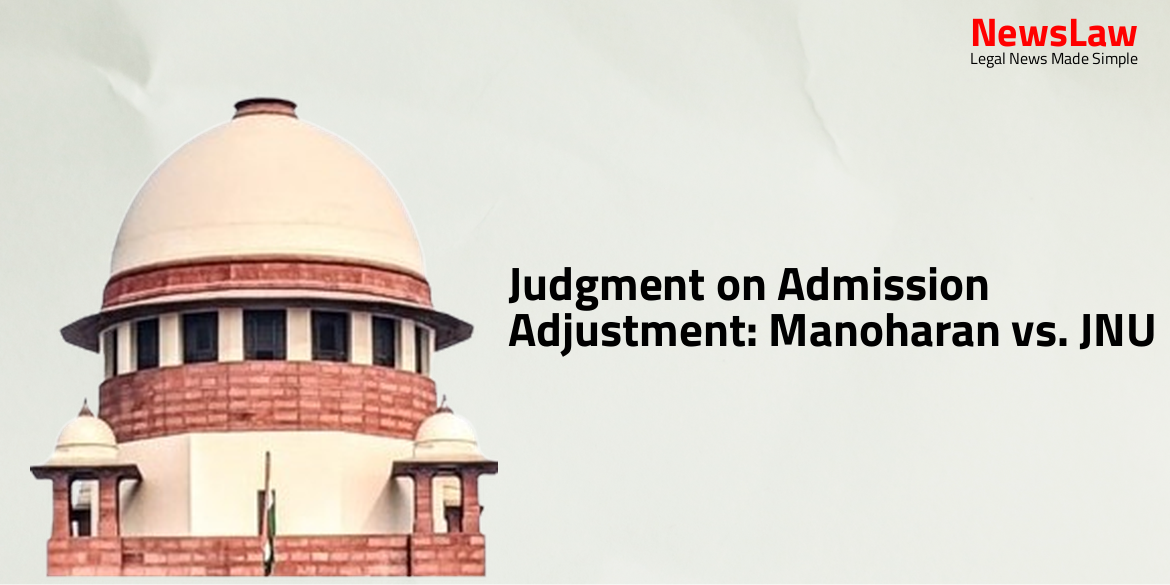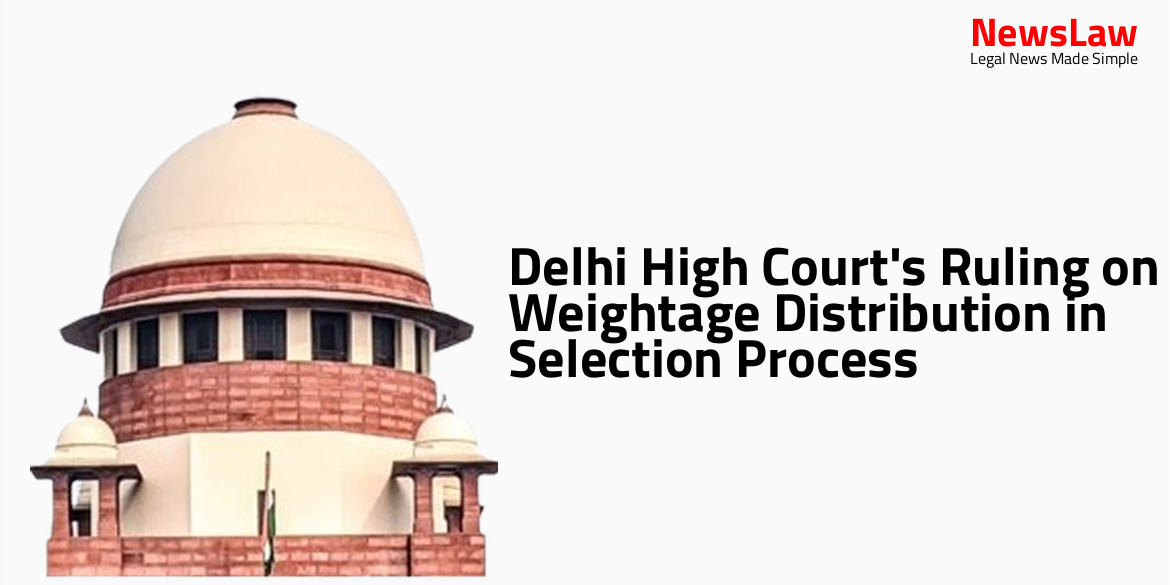In a significant ruling by the Supreme Court of India regarding the electricity sector reforms, the court has upheld the state government’s policy decisions. The judgment sheds light on the importance of adhering to statutory provisions and following government directives to ensure effective implementation in the case concerning electricity reforms.
Facts
- The APTRANSCO filed Aggregate Revenue Requirement (ARR) for the year 2001-2002 before the Commission set up under the Reforms Act, 1998.
- The APTRANSCO proposed a wheeling charge of Rs.1 per Kwh for energy transmitted through its network.
- The Commission considered the reduction of Technical Losses in the transmission system through bulk transmission of power at extra high voltages.
- Government Orders dated 18.11.1997 and 5.8.1995 specified wheeling charges for non-conventional energy sources and mini-power plants, respectively.
- The Tariff Proposal for year 2001-02 included transmission and bulk supply business, along with distribution and rental supply business proposals.
- The APTRANSCO and APERC filed appeals concerning tariff orders passed in 2004-05, 2005-06, and 2006-09.
- The levy of grid support charges and wheeling charges on various categories of Generators and consumers was a key issue discussed in the appeals.
- APTRANSCO held the bulk supply license until 2005, after which APDISCOMs took over.
- Grid support charges were not governed by pre-Reforms Act or post-Reforms Act Government Orders, but based on the APERC-approved grid code.
- The APSEB activities were separated post the Reforms Act, 1998, with APTRANSCO handling transmission and APDISCOMS handling distribution.
- APERC was constituted under the Reforms Act, 1998, with tariff fixation authority vested in them.
- The part discussed the system losses, technical losses, and the importance of grid support charges for maintaining system stability.
- The APERC was constituted under the Reforms Act, 1998, and treated as State Regulatory Commission under the proviso to Section 82 of the Electricity Act, 2003.
- The order of the Commission was challenged before the High Court.
- The High Court’s judgment dated 18.4.2003 allowed the appeal and set aside the Commission’s order dated 24.3.2002.
Also Read: Supreme Court Ruling on Exemption of Excise Duties and Cess
Issue
- The next question is whether the impugned notified orders are invalid due to contravention of Articles 19(1)(f) and (g) of the Constitution.
Also Read: Jurisdiction in Territorial Waters: Karnataka State vs. Great Eastern Shipping Co. Ltd.
Arguments
- Equitable principles of promissory estoppel do not apply in this case as per precedent cases.
- The Reforms Act, 1998 prevails over any vested rights or concluded contracts.
- Policies are subject to legislative interventions, and once statutory provisions are enacted, they must be followed.
- The Reforms Act, 1998 signifies the government’s obligations for reforms in the electricity sector.
- The State government’s policy decisions are binding, as per Section 78(A) of the Electricity Supply Act, 1948.
- The Central government’s guidelines on energy generation in line with international commitments must be adhered to.
- The repugnancy of the Reforms Act, 1998 was challenged but dismissed.
- The State government’s power under Section 12 of the Reforms Act, 1998 holds significance.
Also Read: Preservation of Fundamental Rights in Education
Analysis
- The Commission has the power to fix tariffs under the Reforms Act, 1998.
- Regulations made under Section 178 override existing contracts between regulated entities.
- The Doctrine of Promissory Estoppel may not be enforced against the Government in certain circumstances.
- The High Court’s decision on wheeling charges being illegal and improper was found unsustainable.
- The Commission can determine the wheeling charges for transmission.
- The Commission’s order on Grid Support Charges should be upheld.
- The Commission’s decision on revenue calculations and tariff proposals is in accordance with Section 26(5) of the Reforms Act, 1998.
- The regulatory function of the Commission includes promoting efficiency, economy, safety, and regulating licensees.
- The Commission may issue guidelines for filing revenue calculations and tariff proposals.
- The Commission’s order is considered reasonable and in the interest of the general public.
- The impugned Regulations make an inroad into existing contracts and must be aligned with statutory obligations.
- Transmission licence holders are authorized to transmit energy in accordance with prescribed conditions.
- The Commission can grant licences for transmitting or supplying electricity in specified areas.
- If the Commission deviates from specified factors while determining licensees’ revenues and tariffs, it must record reasons in writing.
- Methodologies and procedures specified by the Commission must ensure the objectives of the Act are achieved.
- Licensees must adhere to tariff proposals and revenue calculations accepted by the Commission within 90 days.
- The Commission must ensure licensees comply with their licence provisions regarding charges for electricity sale.
- Tariffs published by licensees must be notified and take effect after a specified timeframe.
- Licensees must provide details of proposed tariffs to the Commission at least three months before implementation.
- The Commission has the power to amend licences and regulate licensee operations for efficiency and consumer protection.
- Licensees’ proposed tariffs must not show undue preference, be just and reasonable, and promote economic efficiency.
- The Commission is responsible for various functions including aiding and advising on electricity matters and issuing licences.
- The State Government can issue policy directions on electricity matters but must not interfere with the Commission’s powers.
- Licensees must submit expected revenue calculations and tariff proposals to the Commission annually for approval.
- APTRANSCO is responsible for determining electricity requirements and owning extra high voltage transmission systems.
- The State Government can issue policy directions on subsidies for electricity supply with the Commission’s consultation.
- Bills for energy supplied must align with notified tariffs, and disputes between the State Government and Commission can be resolved by a retired Supreme Court judge.
- In the case of PTC India Ltd. v. Central Electricity Regulatory Commission, reliance was placed on the decision in Karnataka Power Transmission Corporation Ltd. v. Amalgamated Electricity Co. Ltd., which discussed section 394 (2) of the Companies Act, 1956.
- Transmission Corporation of Andhra Pradesh Limited v. Sai Renewable Power Private Limited & others considered G.O. MS dated 18.11.1997 and 22.12.1998 regarding tariff review for electricity production from non-conventional sources.
- Binani Zinc Limited case highlighted the need for fixing tariffs strictly within statutory limits by Electricity Boards.
- APTRANSCO emphasized the costs involved in maintaining and upgrading the electricity transmission and distribution system infrastructure.
- Regulations under Section 79 of the 1948 Act were to be followed for all contracts.
- Various court decisions like K. Ramanathan v. State of Tamil Nadu and V.S. Rice and Oil Mills v. State of Andhra Pradesh have defined regulatory powers extensively.
- Transition losses during transmission must be accounted for, as established in Jagdamba Paper Industries (P) Ltd. v. Haryana SEB.
- Adani Power (Mundra) Ltd. vs Gujarat Electricity Regulatory Commission & Ors. emphasized interpreting contract clauses plainly.
- The Reforms Act of 1998 provides the Commission with the authority to determine charges.
- V.S. Rice and Oil Mills v. State of Andhra Pradesh upheld the regulatory power of increasing rates post an agreement.
- Tariff fixation is considered a legislative function per Ashok Soap Factory v. Municipal Corporation of Delhi.
- Binani Zinc Limited v. Kerala State Electricity Board & Ors. emphasized the importance of following statutory limits for tariff fixation.
- The Court opines that there has been no material change in the facts and circumstances of the case to invoke promissory estoppel based on previous Government orders.
- The Government has not provided any subsidy post the mentioned orders, as subsidies are governed by statutory provisions in the Electricity Act, 2003.
Decision
- The High Court’s judgment on wheeling charges and Grid Support Charges is set aside.
- The Commission has fixed the wheeling charges for the financial year 2002-2003 based on various expenditures.
- The APTEL’s order regarding the continuation of incentives as per Government Orders dated 18.11.1997 and 22.12.1998 is set aside.
- Section 65 of the Electricity Act, 2003, regarding subsidies to consumers is mentioned.
- The Government has not issued any direction to continue incentives in the form of subsidy.
- The order of APTEL based on the Doctrine of Promissory Estoppel is deemed to be not in accordance with the law.
- The APTEL’s decision is set aside, and the APERC’s orders are restored.
- The question in the third batch of appeals is whether incentives should be continued for non-conventional energy projects.
Case Title: TRANSMISSION CORPN., A.P. LTD. Vs. M/S. RAIN CALCINING LTD. .
Case Number: C.A. No.-004569-004569 / 2003



